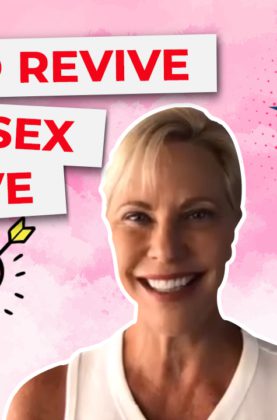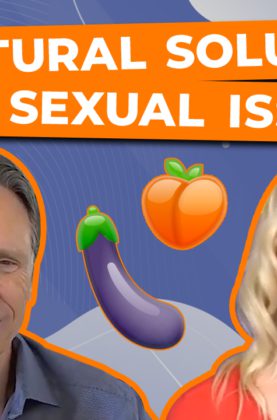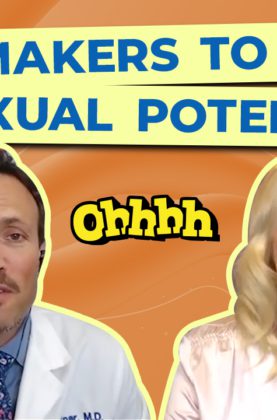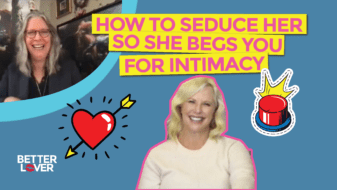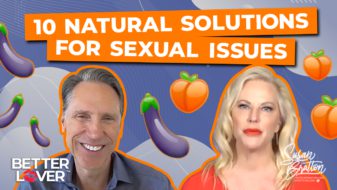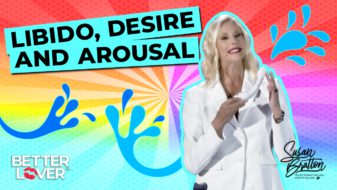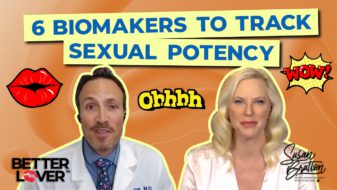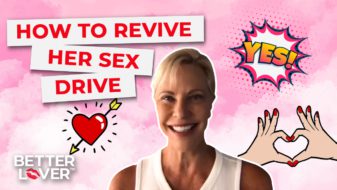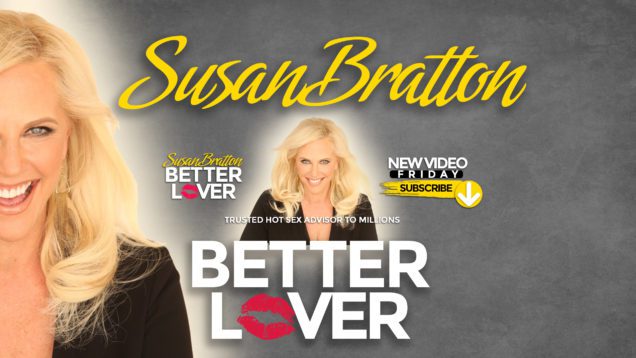Rewriting Your Libido Story
betterlover
Get the latest sexual health and wellness tips by email, click here.
Rewriting Your Libido Story
Guest: Dr. Keesha Ewers
The contents of this presentation are for
informational purposes only and are not intended to
be a substitute for professional medical advice,
diagnosis, or treatment. This presentation does not
provide medical advice, diagnosis, or treatment.
Always seek the advice of your physician or other
qualified health provider with any questions you
may have regarding a medical condition.
Susan: Welcome to the Sexual Vitality Summit. I’m your host, Susan Bratton. On this segment are with Dr. Keesha Ewers. We’re going to talk about rewriting your libido story. Dr. Ewers is an integrative medicine doctor. She’s a doctor of sexology. She’s a family practice advanced registered nurse practitioner. She’s a psychotherapist, an herbalist, a board certified functional medicine and Ayurvedic medicine doctor. And she’s the founder and medical director of the Academy for Integrative Medicine Health Coach Certification Program.
As you can tell by that lofty introduction, Dr. Keesha Ewers, really knows what she’s talking about. And I think you’re going to find in this particular segment is that we’re going to talk about how your early childhood programming and the things that have impacted your life are impacting your sex life. It’s going to raise your awareness about how much of your world is reflected in what’s going on in the bedroom. And once you have the awareness, you’re going to be able to rewrite your libido story. And go on to have the most incredible intimacy and pleasure of your life after on hour today with Dr. Ewers.
So, Keesha, is it okay if we just go straight up Keesha the whole interview? Keesha: Please, please.
© 2019. All rights reserved. 1
Susan: Well, I just think you so eminently qualified in so many modalities. And having some of the traditional ancient wisdom combined with your tantric knowledge as well as sexology, which is kind of the modern day science of sex. With just straight up functional medicine. I just haven’t met anybody who has the level of qualifications and the different kind of quadrants of sexuality, spirituality, and ancient wisdom that you have. You are really an impressive woman.
And I’m so happy to have you here talking about libido. Because for so many people we think, “Oh, libido. My libido is low because my hormones are low. I need to go get hormone replacement. And that’s going to fix everything.” Like it’s some magic pill. Which you and I have talked about that it is not.
And so, this idea of what is libido? What drives our libido? Let’s just start there. And then let’s get into your hurt model, which I think is an academically excellent structure for us to look at what has turned us into who we are in the bedroom and in life.
Keesha: Beautiful. I mean, you know, the thing of it is, is libido the way that I conceptualize it and think about it is quite different from what a lot of people in our culture think about it. When we hear the word libido, we often hear sex. And sex drive. And the way that I think about it is desire. And that can be sexual desire. It can be desire for intimacy with the things you love in your life. It could be hiking. It could be writing a book. It could be parenting or your job, you know. We are intimate with everything that we allow in and our vulnerable bed.
And so, desire is a Latin word that actually means from the stars. And so, I always think of libido and desire as something that is our birthright. And if it’s our birthright to feel that desire for intimacy, for the things that we want in our life purpose. Then women in particularly are just really endowed with the most amazing gift as their birthright. We’re the only part of the gender spectrum here that has the unique ability to have some part of our body that’s designed strictly for pleasure. For men, their penis is functional on a whole lot of different levels. We have a clitoris and its only job is pleasure. And so, we cut ourselves off with this need to achieve, need to be productive, and stomping down our desires for what’s important to us in our life.
And so, it will show up in a whole bunch of different ways. I don’t take care of myself by exercising. I don’t engage in self-care activities in terms of eating well or sleeping well. Because I’m staying up after the children go to bed and I’m getting my work done until two o’clock in the morning. All of that stomps out your libido, on all levels.
© 2019. All rights reserved. 2
And so, the reason I came to think about it this way is because Ayurvedic medicine, the sister science of yoga, it is about five thousand years old. They really thought about each of us as different. We each have our own different, unique fingerprint. We’re all different people. So, we are unique in the way that we should be fed, watered, and taken for walks. It’s not all the same. There is not one size fits all.
And they think about what drives each one of us as life force by vitality. They call Ogist in Sanskrit. And I call it now, o’juice. And what that is, it’s your force for what is it that you want out of life? You know, what brings you joy? What brings you pleasure? And maybe it isn’t just sex. Maybe you don’t want to have sex. But I want you to have a choice. Because you have enough energy to make that choice.
And so, there are all kinds of ways along your developmental path as you’ve been growing and evolving in this life that have gotten in the way of your ability to really have choices. I can’t tell you how many people come into my office looking for hormones. When in fact when I ask them, “Why do you think you need bioidentical hormone replacement therapy?” They’ll say things like, “Well, my libido is gone. I have brain fog. I can’t remember where I put anything. I’m moody. I’ve gained weight in my torso.” And I say, “Yeah, those are all signs of a hormone imbalance for sure. So, tell me when the last time you had a libido level that you were satisfied with was?” And I often hear, “I’ve never had libido.”
And I say, “You know, estrogen, testosterone, and progesterone are not going to be magic. They don’t bring something that was never there, you know, up.” And I say, “Do you like your partner? That you’re engaging intimately with?” And if they say, “You know, he had an affair five years ago and I forgive him. But I don’t want to have sex with him.” Again, testosterone, progesterone, and estrogen are not going to solve the problem.
So, I started really thinking critically about this and saying, “Is there anywhere in the medical literature that reflects what I’m seeing in my office with my patients?” And there wasn’t. So, I did the study that you talked about a second ago. And, you know, it really illustrates the fact that there are all kinds of blocks to our desire in life. And we can conceptualize the sexual libido, but we can also conceptualize that as our whole life vitality.
Susan: Yeah. I often say that libido and sex drive are just other words for creativity. Your life-force. Your lust for life. Your appetite for life. If you are not feeling creative and excited in life. If you are bored, anxious, depressed, angry, bitter, or resentful about things that have happened in your life, with your partner, to yourself, you’ve experienced trauma, or shame that have
© 2019. All rights reserved. 3
dampened your spirit. Spirit is another word for your energy, vitality, sex, drive, lust for life, libido.
And so, what we want to do today is we want to help you get some awareness around what parts of you have gotten hurt, damaged, repressed? And how can you identify those? And how can you soothe them? How can you forgive? How can you move beyond? How can you let go? Because what I see, so many people struggle with is not a good sex life is not available to them.
But that they have had so many insults to their vitality, creativity, lust for life. That they’re wounded. You are wounded if you don’t feel horny, turned on, excited about your partner, feeling good about your body and your genitals, feeling that you deserve great sex, and you’re having great sex. Then let’s close that gap for you. Let’s show you how you can close the gap. How you can get over those things and rewrite your libido story.
So, what’s the first step, Keesha?
Keesha: Well, first, I’m going to classify low libido in two different categories. Because there are two different times. One is acquired low libido. And one is innate. Innate low libido means you’ve never had sexual desire, desire for yourself, or a partner. You know, that never did happen.
Acquired is when you have a happy rocking sex life and intimacy with your partner. And then it sort of all of a sudden feels like you have glass in your vagina when you have intercourse. You know, that’s a clear need for bioidentical hormone replacement, right? And you have to address the entire endocrine system, not just your ovarian functional. And that is another whole discussion.
But when you’re talking about those two different kinds of low libido, then the innate where it’s been there forever. That’s not hormone related. And half of low libido, women with low libido have that kind. It’s a little less than half. Which is staggering when you think about that. And that’s usually from anxiety, depression, and mood disorder of some sort. OCD. And usually the root cause is trauma. And so, when you think about that, then closing the gap and talking about first step is going to be a little bit complicated. And we will go through that.
So, if you set aside acquired low libido and move just to the innate. I did a study called The Healing Unresolved Trauma Study. And what I found is, is that every single person has had trauma. And there will be capital T trauma. That will be the stuff you think about sexual abuse, emotional, mental, physical, neglect of some kind. What the Adverse Childhood Experience Study
© 2019. All rights reserved. 4
illustrated that there’s neglect from a parent being incarcerated, addicted to a substance, or having a mental illness that you have abandonment. Those capital T traumas will cause brain changes. You could say brain damage.
And it’s a shrinkage in the prefrontal cortex. Which is our adult brain, the one that is required for impulse control. And we have a growth in our amygdala section, which is the fight or flight center. When you are in that space, you’re hyper vigilant looking for insults, as you just said. You are looking for danger, right? And when you’re doing that, you will find it. You will find people that are there to step on your toes because you are looking for hard for it. Life always provides us with what we are looking for.
When you’re a child, you can have capital T trauma, or you can have lowercase t trauma. And what that is, it is the stuff like, I did therapy on a man one time that tripped in the lunchroom, in the cafeteria in middle school. And dropped his meal everywhere. It clattered and made a big scene. Everybody in the lunchroom laughed at him and it was in front of a cute girl that he liked. And so, he decided as a result of that was that he was a clumsy ogre that no one could possibly like. And so, he ate for the rest of his schooling all the way through high school by himself in the library.
So, he came to see me because he was working for a big corporation here in Seattle. And he had to get up and do you know things in front of other people. And he would get social anxiety. He would sweat. And he would sweat through his shirt. And he was so embarrassed by the whole thing. And it turns out it was from this root thing that had happened when he was in middle school.
So, what happens is we have some sort of rejection that will be trauma. And every single person has had rejection in their childhood, right? It can be anywhere from not getting picked for the baseball team to being clumsy in front of somebody to failing on a test or whatever. You just name it. We’ve had it. And what we will do from that is we’ll create a belief with an undeveloped brain. Because our prefrontal cortex is not fully developed until we’re 26 years of age. And we’re self-centered when we’re children, we’re supposed to be. That’s our developmental state. We are little humans trying to find out how to be big humans on planet Earth.
And so, everything that we make up is about us. Like if our parents get divorced, it’s our fault, right? So, you make up a belief to fit the meaning you just created around what just happened in your lower case t trauma. And then you’re going to create an adaptive behavior response. Like this guy decided he needed to be invisible. And he created a way of being invisible for his whole life until it didn’t work anymore for his job.
© 2019. All rights reserved. 5
So, the first step for him was to go back and heal that event. And change that meaning that he made up, that he’s too clumsy, too stupid for anyone to really respect, admire, and love. And reframe that belief that he needs to hide or he’s
not safe, or he will be rejected. And create a different behavior, which means practice getting up and giving presentations in front of maybe just two people. Then three, then four, until he can self-regulate.
And so, part of the work that you do is you learn how to stay in the adult brain and out of the limbic system, the fight of flight, the child brain. You have to build a bridge between the two. You have to be able to go back to that little kid and say, “Okay, I’ve got this now. That was a really terrifying, horrible experience in that moment. But it’s not true anymore. And so, I’m here. I’m going to take over from here. You can go over there and color in the corner. Do child things. And I will take it from here.” And you have to practice how to do that.
And so, it’s really staying in your adult self. And making sure that your adult brain stays online. Now, if you have PTSD, like I said, there’s that shrinkage. When I did my PhD work, when I discovered when I mapped a whole lot of brains and looked at the research with PET scans. I found that the same exact areas required for women to have sexual desire are the same areas that are hijacked in PTSD.
So, if you are activated in fight or flight, then the dopamine responsible for you to actually have desire and the parts of the brain that light up when we get someone turned on inside of an MRI machine, don’t light up. Because you’re already hijacked from this past trauma. So, you know, that first step is the willingness to self-confront. To say, “Oh, I have a pattern. Wherever I go, there I am.”
It’s not everyone else’s fault, right? I need to take responsibility for this. It’s not because my husband can’t read my mind and he shouldn’t have to or my partner. It’s not because I’m terrible, I lack skill, or whatever it is. Innately, that might be true. What’s keeping you from learning those skills? What’s keeping you from articulating your wants and desires to your partner? What’s keeping you from being able to communicate clearly from an adult space is because you’re locked into a terrified child. So, it’s that willingness to say, “Oh, that actually had a big impact on where I am today. I’m going to go and I’m going to work with it.”
Susan: One of the things that you’ll find when you’re addressing this, if this is something that’s impacted you. Is that during lovemaking, a lot of times what your body’s trying to do is cope with the fear. So, here you are and you’re going to have sex with your partner. But you can’t look him in the eyes. Or
© 2019. All rights reserved. 6
you close your eyes and you kind of go away. Which is called dissociation. You disconnect your feeling from your body, from the stations that you’re experiencing.
Keesha: Which you learn to do as a child when you’ve had trauma. Because it’s the safe thing to do.
Susan: Yes. So, it’s your protection mechanism of your body trying to keep you safe because sex is danger. So, what you will notice is that if you can open your eyes and bring yourself back to the present moment and focus on what you are feeling, your sensations. You can have your partner put his hand on your heart and his heart. You can have them calm you down by stroking your hair. By talking to you. By bringing you back. By soothing your body. By holding you.
Any time you feel yourself leaving your body, tell your partner, “Bring me back. Bring me back.” And have them stop whatever they are doing. Because sometimes it’s a certain touch. Or something like that, that can trigger you, and bring you back in. If you’re thinking to yourself, “That doesn’t feel good. I’m not happy. Oh, it’s going to hurt. I don’t like this. I’m not getting off. How come this doesn’t feel good?” When you’re there, just take a pause. And say, “Hey, hang on a second. Help me get back. Let me get back to feeling connected to you.”
Keesha: And you have to have a partner that’s willing to do that. And then that’s really important. Because fantastic sex comes from fantastic communication. Crappy sex comes from crappy communication, right? And so, you do have to have a partner that can self soothe themselves. You know, enough to be able to take that feedback of, “Okay, you are not doing anything wrong. I need some grounding right now. Here is what is going on.” I’m shocked, I don’t know if you see this. I’m shocked at how many couples will come to me and say, “We haven’t had sex for 15 years.” Or a woman will be in my office and say, “Yeah, it’s been about 15 years.” And I’ll say, “Well, how does your partner feel about that?” “Well, we’ve never discussed it.” I’m like, “You have never talked about it at all?” It is really amazing to me how this gets swept under the carpet.
And a new normal is established, quickly. And our bodies are like that to a cell comes online to go in to learn how to be a cardiac cell. And the heart is remodeled in 24 hours. And I’ve noticed this sort of like co-dependent maladaptive response system between two people and a couple can also be that way really fast.
© 2019. All rights reserved. 7
And then when you come back together, there’s awkwardness. And there’s this inability to really express what’s going on because those communication skills were never learned. So, you do have to have a partner that’s willing to make sure that you are part of the equation. And I think that’s who I do therapy with the most, are the people that can’t do that.
Susan: I want to finish what I was saying. The second thing that I wanted to tell you that is going to happen to you when you are going through this process with your partner. And I will address the partner piece in a second. You are going to want to run away. That parasympathetic nervous system, the fight or flight response is making you get twitchy legs, fast heartbeat. It’s making you want to leave. And that’s another signal that you need to stop and reconnect. And do what Keesha said, grounding. Get grounded. Have hands laid on you. Be held. Connect heartbeats. Breathe deeply. Those kinds of things.
Over time, these feelings will pass. You are retraining your body to be calm. And once you can be calm during sex. Then you can begin to feel arousal. You can’t go from fear to turn on. There are some people that have that bridge. They are the people who like to fight and have sex afterwards. So, that is an off bridge. That is not a good one.
So, what I am saying to you is that when you enter into this awareness that you have this issue and then you begin to see how your body is responding by dissociation, by fight or flight feelings. Then you know you’re hitting the fear buttons and then you can begin to overcome them by calming yourself down. That doesn’t last that long. You can get through that in a matter of weeks, months, maybe a year, year and a half, the longest time.
Trauma can be healed. And it can actually be healed very easily. The thing about trauma, any kind of trauma. Like tripping in junior high in the lunchroom trauma, right? It doesn’t matter where your trauma came from. No one is going to judge you for what happened to you and how it affected you. It could have been a lack of attachment bonded parenting. And no one ever held you. And you have a hard time being held. There are a million reasons for it.
What you want to notice is when it’s occurring and how to get through that moment. Because soon you’ll retrain your body to love touch, to feel calm, to be able to connect, and then to be able to feel sexual pleasure. The other piece of it is that most people don’t go to therapists. Most people cure themselves and each other. And we’re giving you the tools to do that together because the majority of partners heal each other through these wounds by learning these techniques.
© 2019. All rights reserved. 8
So, if you think to yourself, “My partner will never do this.” Don’t underestimate your partner. Maybe you aren’t allowing your partner the gift of supporting you through the healing that you need to do. Maybe it’s going to go both ways because most men have as much shame, frustration, lack of modeling, lack of touch, and more lack of touch than women do. So, it is available to you.
So, let’s continue. I just wanted to say those two things.
Keesha: So, the resistance to that, of two people being able to do that by themselves will usually come from what David Schnarch calls low desire partner and high desire partner. And I want people to be aware of this because many times I’ll find that a woman won’t be willing to ask for them to be grounded from their partner because they are resentful. Because that partner hasn’t been meeting some high desire of theirs that’s outside of the bedroom.
So, the way this works is inside a very partnership, there will be a high desire partner for something. It can be baking cookies on Sunday. You know, it can be going bike riding on Christmas Day. It’s like some high desire. Usually it’s emotional connection and sexual connection are the two. And they’re not gender stereotypes the way we like to put them. Sometimes the woman is the high desire partner for sex. The man is very emotional connection. And then other times it’s the other way around.
But I live in a place where there are a lot of engineers. Very head centered people, right? And when those people come to bed with a heart centered person who really has a high desire for emotional connection. Their love languages don’t match. Then there can be some resentment and bitterness about, “Well, you’re not meeting my needs over here.” But all of this is usually very subconscious. So, they’ll withhold, right? And then they won’t ask for that grounding that needs to happen and just blame their partner. Or their trauma.
So, the other piece is, again, around communication. Being able to say, “Look, I can feel inside of myself that I am withdrawing. And I don’t really want to do what you want sexually because you are coming home, sitting on the toilet with your iPhone and not coming out for an hour and a half. And I’m having to put the kids to bed. Or you’re not going home at all.” And so, there’s this there’s polarization that will happen where the high desire partner will become the lower desire partner for somebody that has the other one, right? So, it will go like this and it will get polarized.
So, really great communication between the two of you will solve that in under an hour. If you can be aware that it is happening. Instead of just doing the
© 2019. All rights reserved. 9
withholding from one another and getting further and further apart. And of course, whenever you get into that place, we can call that an emotional gridlock. And when you’re stuck there, that’s actually a really good place to be. Because in that moment, that’s the time when you can move into your next level of conscience. And it acts like a catalyst for growth into your relationship, moving into a higher level if you’re willing to say that’s what this conflict can be for us.
A lot of couples are really afraid of conflict. And think that something’s wrong inside the relationship. I would say that’s not true.
Susan: There’s a couple of things. You mentioned Dr. David Schnarch. He wrote a book called Passionate Marriage. And it’s a great book.
Keesha: And, The Crucible.
Susan: And, The Crucible, is the fact that you are in this bowl of fire together in a relationship. And you are being tempered by the experiences that you’re bringing into this bowl together. And you have the opportunity to cut the crap. Stop being a martyr. Give your spouse the benefit of the doubt and your total honesty. So, that you can work alchemical magic in that bowl instead of just burning up in a fiery mess.
Keesha: Make gold out of lead, exactly.
Susan: Exactly. Make gold out of lead. The second thing, too, was there’s another thing. So, one of the one of the techniques that I think is the most fundamental thing that I probably teach is something called relationship values. I have a little workbook called Relationship Magic. And this workbook lets you explain to your partner what it is you need most out of your relationship with them.
And that then allows them to explain what they need most out of their relationship with you. Because what we find is that people go by the golden rule in relationships. Treat your partner the way you want to be treated. When in reality, you are two totally different people with totally different life experiences. And likely completely different physiology. Because one of you is masculine, one of you is feminine.
Keesha: Or not. Maybe it is the same sex. But it is still going to hold true.
Susan: Even if it is same sex. But especially if one is testosterone forward and the other is estrogen forward. It makes you even more different.
© 2019. All rights reserved. 10
And so, you understand each other less. But you need entirely different things. And so, once you give your partner the checklist of the top things that you need in your relationship to be happy and to feel the feels you need to feel in the relationship with them. And you start working their list and treating them the way they want to be treated. That gets rid of a lot of the resentments and the high desire, low desire, delta the difference is that you have that aren’t being met. When you begin to meet each other. Then you can come together in the bedroom, literally and figuratively. To enjoy and move toward any kind of hurts, resentments, or low libido issues that you have around your sexuality.
So, there is a step by step process for this. And I think what we’re doing is laying that out for you really well here. So, let’s take next steps, Keesha.
Keesha: Alright. So, once you have understood that all of the problems that are happening with your libido are actually not due to forces outside of you, but inside of you.
Susan: Well said.
Keesha: Then then that’s the self-confrontation process that I talk about. Then you can actually look at your partner as your greatest teacher. And you see what’s reflected back from them in you. And that’s a mirroring exercise that I talk about. And I detail in my book, Solving Autoimmune Puzzle. Because a lot of times what I see is low libido, it can be a symptom of an undiagnosed autoimmune disease, any other chronic illness, or medication that you’re on. It can be it can be due to the mental constructs from childhood, emotional hurts, cultural stories. But oftentimes it’s the things that are causing the low libido from the mental, emotional, and spiritual are actually part and parcel of the root cause for any illness you might have for your fatigue, for your weight issues. It’s causing all these things together.
And so, when we can get to the bottom of that, you solve a whole lot of issues. You know, you water the root of the tree, the branches will bear fruit. And so, the next step then is during this mirror work. And it’s really pulling yourself out of what I call the judgment state. I have a lot of graphics in my book around this where when we are hurt by somebody we say, “I would never do that.” And I always say, “If you say I would never do something that you have just heard someone has done or experienced it, you are in trouble. Your ego has just taken over.” And when you are operating from ego space, you are operating from protective child psyche. And when you have two children in bed throwing sand at each other, no good can happen.
It’s really coming into that place of, “Okay, we are on equal ground. I’m willing to do this mirror and reflection word. And then from there forgiveness.” And
© 2019. All rights reserved. 11
forgiveness, this was part of my PhD work too. Using forgiveness as an intervention for low libido. And it works amazingly well. But the kind of forgiveness I’m talking about is not lip service forgiveness. Where it is just, “I forgive you.” It’s the same thing where I had a lot of women coming into my practice saying, “Well, I have forgiven him. But I don’t want to have sex with him.” It means that he hasn’t really been forgiven, right? He’s become tolerated, but he’s not forgiven. And so, that judgment hasn’t left the scene yet.
So, there’s a whole process that I do for that. And I have a program on my website for it that goes through and it uses reflection, mirroring, and then finally, forgiveness. One of the things, the Buddha and Mark Twain, have both been given credit for this. But not forgiving someone is like you drinking poison and expecting the other person to die. Or the Chinese they say, “You dig two graves instead of one when you don’t forgive.” So, I think this is one of the free medications or medical interventions that exist in the world today. And it’s also a free intervention to amazing sex. Forgiving all of those old hurts. And really looking at your partner as your teacher and your equal. And the reflection of parts of you that you don’t like.
And when you can do that, and you can say thank you for being my teacher. Then, you know, you’ve truly forgiven them. And, you know, I was sexually abused when I was in elementary school by the Vice Principal at my school. And when I did this work around him, it wasn’t reconciliation. So, if you’ve been in an abusive relationship, if you’ve had sexual predatory stuff that’s happened to you, and trauma of that nature. Forgiving is essential. Reconciliation is not. And people get those two things confused.
So, what Susan and I have been talking about thus far, is safe relationship. So, if we move into abusive relationships, this discussion changes entirely. And I just want to make that distinction. You have to forgive. You don’t have to reconcile. If that person has not expressed contrition and demonstrated that they’re safe. And gotten help for whatever it is that they’ve done. And you only do reconciliation for relationships that are important and value. Good boundaries are important.
Susan: I think that compassion is also very important in this conversation of forgiveness. A lot of times when we’ve been traumatized, we’ve been hurt. And someone has done something to us. And we carry that hurt, that shame, and
its expression of negative impact into our not only sex life but our life as Keesha has been explaining to us. If you’re listening to this conversation about forgiveness and you think to yourself, “This isn’t is something I need to listen to.” Replay that section again. Because the thing that I have found that is, I would probably say, the number one thing that holds people back from
© 2019. All rights reserved. 12
moving toward more pleasure and connection is unrequited anger and lack of forgiveness.
And let me give you a reframe on it. If someone has abused you, I was abused by my stepfather. I was sexually traumatized over and over again as a child by my stepfather. My mother didn’t believe it. She couldn’t take it in that this could be happening because it would have screwed up her life so much. That she couldn’t hear me say it or believe that I said it. To this day now, of course, she feels horrible about it. I even hate mentioning it. Not because it bothers me. But because if my mom watched this, she’d be like, “Oh, god, I’m so sorry.” All over again. “I can’t believe I didn’t believe you.” You know, that kind of thing.
Keesha: Yeah, my parents feel the same way. “I am so sorry I didn’t protect you. That I didn’t hear it.” Of course, you know. “Mom and Dad, this is not even about you.”
Susan: “Mom, you did the best you could do.”
Keesha: The best you can do.
Susan: I wouldn’t be who I am without you.
Keesha: Exactly, exactly.
Susan: When I realized that I was merely victim. I didn’t do anything wrong. And that my stepfather was hurt way more by what happened than I was. Because he was the perpetrator. He was the person that was so screwed up that he would sexually abuse his own daughter. A little girl who had no defenses. What must it have been like for him? What happened to him? What was that generational defect that came down through his family? What physiological pain and suffering did he go through? What was happening in our culture at the time that allowed that to even happen? What about all the people who knew it was happening and didn’t intervene?
Like my mother’s best friend who knew it was happening to and wasn’t empowered. How did all those people’s lives get affected by it too? When I think about that and I think about that poor man had to be that guy in his life. How horrible must have been to have been him. And all of the other people who were affected. I was an innocent victim. In a way, I got off easier. I wasn’t the horrible victimizer.
Keesha: This is a more advanced teaching, Susan. So, if any of you are shutting down. This where you need to get to where Susan is at. Where I’m at. It is getting out of that and really having compassion when you can come out
© 2019. All rights reserved. 13
of judgment. That’s where you can be. And you can be like, “Oh.” And then you can find your own inner abuser. Where have you been out of integrity with your power with others? Not the behavior. But with the same motivating force, right? Of being out of integrity with how you use your power.
So, yeah. That’s what I’m talking about when I say this is a more complicated process. Then just saying in church, “I forgive them.” That is so different.
Susan: I’d like to where you can go with all of this. You don’t have to do that now. You might be thinking to yourself, “I could never forgive them.” You know, that might be where you are now. But I can tell you that it is extremely freeing to move all the way through. You know, in jujitsu, they teach you not to break the brick with your hand. But to break through the brick. If we’re talking about the brick, but I don’t show you how to kick through it. Then I haven’t done my job for you yet. You’re going to go here. This is your trajectory. That’s what Keesha and I are showing you.
And so much of our inability to feel sexual desire comes from the layers and piles of stuff that has been put on us around shame, repression, abuse, and all of those things sexually. In addition to all the other things that have happened to shut us down in our lives.
If you are not feeling this well spring of turn on, desire, juiciness, and appetite, you can get back to that through the core of your health. Because your health and how your body is feeling is dictating your level of arousal, libido, and desire. And through all of these things that have layered on that you can cast off. That you can just let go of. And then all of a sudden, you’re no longer weighed down. And you’re stepping forward into the sexual person inside you that is your human birthright to have that pleasure and connection.
And so, it is possible to go through all of this. You can do it with a counselor. With a therapist. You can read Keesha’s books. And other books like David Schnarch and books on Buddhist compassion and forgiveness. You can do the work to get back to the wholeness that is just dying to throb from within your body right now. It wants you to release it. It wants to well up in you. And it is in there for you to uncover and connect with.
Keesha: Well, it’s important because, you know, Ayurveda says, and I love the way they conceptualize this. “Auto immune disease is undigested anger. Whatever is in your mind crystallizes in your body.” And so, I always say, “What’s in your head, goes to your bed, you know. And so, you really have to do that work if you want freedom. And flow means being in universal flow. And there you’ve got to find and fix the blocks to that flow. And those can be emotional, mental, physical, spiritual or in your libido story.
© 2019. All rights reserved. 14
I want to tell you one more story about setting the perpetrator free, if you don’t mind.
Susan: Please.
Keesha: So, I had rheumatoid arthritis when I was 30. Within six months, I was able to reverse that by doing all the stuff we’re talking about. And that’s a long story in and of itself, but it was reversed. No medication. And I haven’t had it sense.
But a few years later, I was diagnosed around the age of 40 with breast cancer. And when I went in and had an ultrasound done. The tumor was right over my heart in my left breast. It had this beautiful blood supply. It was healthy, vital, growing, and just happy to be there. And when I saw that really vibrant tumor in there. I went, “I know exactly where that came from. And I know what do with it. So, I’ll be back in a month and we will see if I can get this gone.”
So, what had happened four months before that tumor was found by me. Was my son, who was 18 at the time, had come to me after being at college for a year. And said, “Mom, I have something new to tell you.” And sat me down and he was very serious. I said, “What’s going on?” I have four children. And this is my second child.
And he said, “Do you remember when we lived here, and do you remember the guy that lived in our neighborhood that used to sometimes come over and play with us. He was twelve and the kids were like five and three. And every once in a while, I would look outside while they were jumping on the trampoline and
say, “Hey, do you just want to babysit? And I’m going to go to the grocery store.”
So, I found now from Colin at that time that he had sexually experimented with the boys. And I was so upset, obviously. Having had my experience and then just realizing I’ve not protected my children properly. You know, that’s how it hit me. And I just went, “Why didn’t you tell me back then?” And he said, “Because of this. Because I knew this would be devastating to you.” And he said the same thing. You know, he would hurt my family, right? So, I said, “Okay.” And we talked it through. And I had suspected something might have happened because my oldest son had said he didn’t want him to come back anymore. And I said, “You got it. What happened? Why don’t you want to be here anymore?” He didn’t tell me.
© 2019. All rights reserved. 15
So, his mom was my running partner. And so, the next morning while we were running. I said, “I think something happened. And I would like to talk to him.” And she got offended, right? And shut it down. And I thought, alright we just won’t have him over anymore. So, I called her up at this time, fifteen years old later. And said, “I need to find him now. And this is what happened.” So, she gave me his contact information. And when I called him, he said, “I’ve been waiting for this call for fifteen years, Mr. Ewers.” And, I could just hear in his voice.
And I said, “Well, I have a couple of questions. One of them is why?” And he told me. He’d gotten hold of a playboy and wanted to experiment. And my kids were there. And I said, “Okay.” That is kind of like a normal childhood thing. Show me yours, I’ll show you, you know. And so, I went through that. And then I said, “Okay. So, I want to facilitate this healing. And I would like for you to be responsible for the cost of therapy for my kids. I’m going to get them in and kind of see where things are at. And what needs to be cleared.” And then we did this forgiveness process that I just talked about. And it was amazing. It was just amazing how it was so beautiful for him, for my boys, and our whole family.
But what came out for me that I hadn’t realized that came out sideways was this rage, that I didn’t get that from my parents. Because I saw how easy it is to actually facilitate healing in something like this. Without the blaming, without the shaming, without the resentment, bitterness, all of those things. So, I have this deep grief for my ten year old little girl self that I didn’t have that, right? And just rage about it. It was really interesting how it just like exploded. I didn’t do anything with that rage, and I wound up with cancer.
So, what I had to do then was go to my parents. And talk to them about this. And deal with it in the same way I had done with my kids and do the forgiveness process for them. And within a month of doing that, my tumor was gone. In the ultrasound, that same place was now an empty dark spot with these vessels that were just dangling with nothing to feed.
And I don’t want to give the impression that every single person with cancer can just like not do anything but do that. I always look at everything disease as very individual. There are individual root causes, individual interventions. But I knew intuitively with the work that I do that it was going to be really powerful because I knew exactly why I had it. And sure enough, within a month it was completely gone.
And I have genetics set up for breast cancer and autoimmune disease. So, I flipped them on with that rage. And by being able to clear it, I was able to flip
© 2019. All rights reserved. 16
it off. And in the middle of that rage, did I feel like having sex with my partner? No. No, libido, right? What goes in your head, goes to your bed.
Susan: Yeah. Getting over our rage, letting go. What we have really talked about is acknowledging that we have been hurt. And that is possible to heal. It is possible to heal ourselves. It is possible to allow our partners to support us in healing. And it is possible to support our partners in healing. And that there are the tools and experts available to help you.
Keesha, just to wrap up what I would like to do, is I would like you to go back through the steps that we have talked about. And give a clear step by step path. Here is what we said, here is what you do, and this is what you do. Tie it altogether now. Because we dripped it all out. But make it like an executive summary.
Keesha: I’m writing the Libido Cure right now. My book is step by step. And it happens to correlate with your chakra system. So, you can remember this easily. So, the root chakra, first step. Is establishing safety. You have to feel safe if anything is going to happen, right? So, this process that I do is what I am writing about right now. It is always, establish safety first.
The second step, which is going to be your second chakra, which everyone knows is your sensuality. But that is also creativity and your ability to feel beautiful in your skin. Is to really get in touch with your own ability to get in touch with your body. People that have been traumatized, dissociate as Susan was saying. Because the wise mind of the child knows that it is not safe to be in that body right now and leaves. And that is the way it keeps you from having split personality disorder.
So, oftentimes when we become an adult from that space, you are like a head walking around dragging a body behind you. And completely disconnected. And when you are disconnected like that, you have no libido. So, it’s getting back into your body with all of your senses. Really beginning to understand your goddess anchor. And that it is your birthright and your divine essence of really understanding creative ways of expressing your desire for your life.
Then the third is going to be your third charka, which is power center. Which is solar plexus and it is reclaiming your power. The only way you can reclaim your power is by reframing your story. And so, it is really working on that. Rewiring your brain, reframing your story, reframing your power. If you have to do what I did with the neighborhood boy. It was like, “Okay, I need to find out why then am I going to reconcile this relationship? Or am I just going to have a good boundary around it?” That is how you determine where you are going to be powerful.
© 2019. All rights reserved. 17
Then you go into your heart center and that is where you connect the divine. You don’t connect to spirit or whatever your name of this is. To God, to life force vitality, through your head. That is just not a thing. That is where your ego lives. You go into your heart center. You do the compassion work. Compassion for self, for others, doing your forgiveness process. Really, really working from your heart center. In a way that it is so beautiful because then you start understanding the divine spark is inside of you. You are just a reflection of God. So, you really start to own that divinity of your own.
And then going into your throat chakra, this is all about speaking your truth. From there, you hold good boundaries in your life. You are about to speak your truth directly. You are able to communicate with your partner what your needs are and being able to compassionately tell your truth, say your truth, and help them heal whatever is going on for them. That is a fantastic communication piece.
Then you go into third eye. And third eye is going to be about seeing clearly. From this space, you get to do what I call, creating your life with intention. What is it that you want from this life? You know, you have been so busy in survival mode. Now that you are out of survival mode, what is it that you want your life to be? See that as large and big as you want it to. See without your physical eyes. And see what your life purpose is. Get your vision of what it is that you want and live into it.
Then from that space, you open up your crown charka. And I always say we are a conduit between the grounded-ness of the Earth and the sacredness of the Cosmo. And sexual expression is an expression of being God. It’s a co creation, right? Sex is actually a sacred act.
So, from that space, now you have all the charkas open. You can be a conduit between messages that you receive from high coconsciousness and then also staying grounded and not getting into woo, woo land. Where you can’t pay your bills, you can’t take care of life. I see this all the time in the spiritual world. Where you are not doing spiritual bypass.
But you are grounded on this planet. You are integrated now. You are integrating your spirituality with your materiality. And your sexual expression is the alchemy of all that in your heart. Which is where all this bringing this down, bringing it up, and it mixes in your heart. From there you can be the most loving, amazing, vibrant being, and expression of yourself as possible.
Susan: I can’t wait to read your new book. I really like the construct of healing through the levels of the chakra. That is a beautiful archetypal construct. This
© 2019. All rights reserved. 18
has been a lovely discussion. You are just such a light. Such a beautiful, deeply intelligent, and wonderfully heartfelt person with excellent advice. I’m so happy to call you my friend and to have you participate on the Sexual Vitality Summit. What a beautiful experience it has been today.
And if you would like Dr. Keesha, it’s just DrKeesha.com. You can find out all of these programs she has talked about, links to her books, and getting into her world. Which I hope you will do. And I hope you will now feel more empowered to see the path for healing all the things that have happened to you so you can step into your wholeness and sexual potential and pure vitality yourself.
I’m your host, Susan Bratton. I’ll see you on the other side.
© 2019. All rights reserved. 19


